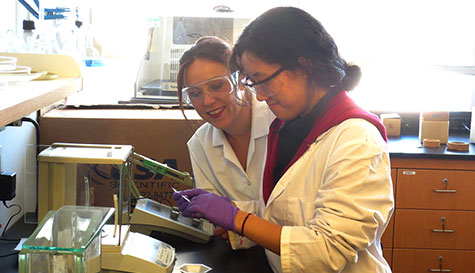Newsroom Archive

Fighting the scourge of cancer does not come easily, or quickly. Just ask Associate Professor Elise Champeil of the Department of Sciences, who was recently awarded a $463,861 grant from the National Institutes of Health to continue her research into the functioning of cancer cells and antitumor agents.
The four-year project — “Role of p21 Signaling Pathway in Response to MC & DMC DNA Interstrand Crosslinks” — builds on earlier research she has conducted into the functioning and efficacy of antitumor agents. MC, or mitomycinC, and DMC (10-decarbamoyl mitomycin C) both kill cancer cells by binding to opposite strands in the DNA molecule, thereby preventing cell replication.
“Both antitumor agents form similar lethal lesions with cells’ DNA, but can ‘kill’ cells using different biochemical responses, according to the genetic makeup of the cancer cells,” Champeil explained. “Thus, the study MC-DMC provides an ideal model for identifying structural drug features determining the cell’s response in the presence of an anti-cancer agent.”
The problem that arises in such treatment, Champeil, noted, is that while many chemotherapeutic agents function through the activation of p53 and other cellular pathways, “at least 50 percent of all cancers do not have a functional p53 pathway. This study has the potential of offering treatment that could be tailored to cancer cells lacking the p53 factor.”
The new trend in cancer treatment is cell-specific rather than organ-specific, said Champeil. “We look at cell DNA, and while MC and DMC both kill tumors by modifying DNA, they have different effects. Our hope is to identify clear difference in treating cancer cells, delineating pathways for cell death. This, in turn, will open doors to follow-up research.
Champeil’s research team includes her colleague Professor Shu-Yuan Cheng and two graduate students, Bik Tzu Huang and Elaan Luckaziewicz.
 Inside JJC (Faculty & Staff)
Inside JJC (Faculty & Staff) Technology Services Status
Technology Services Status

